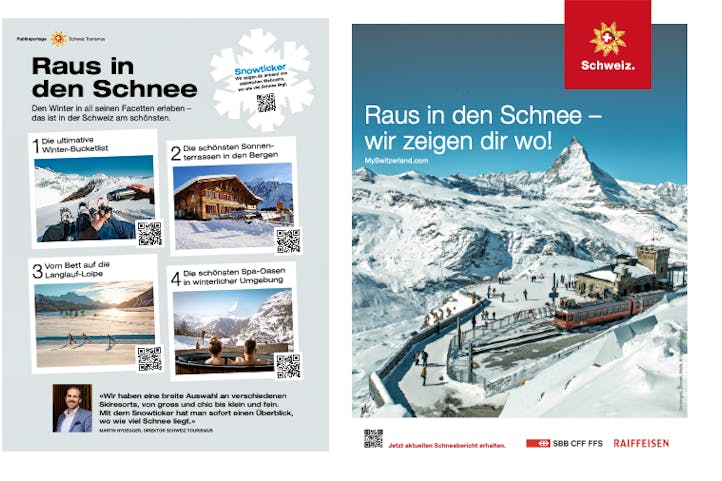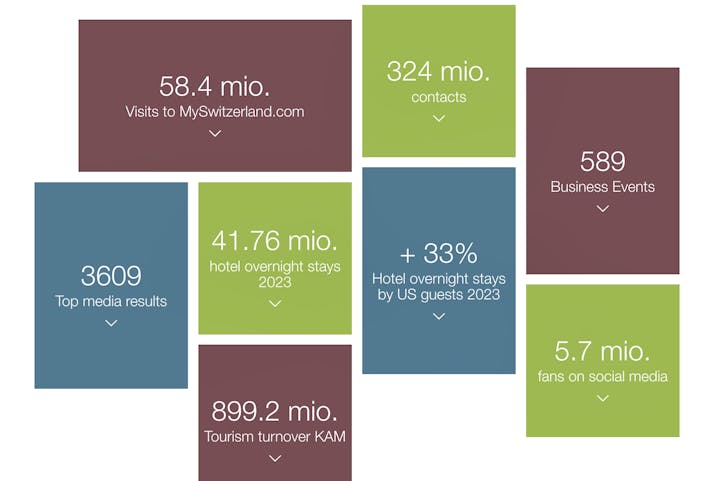Find out more about:
The impact of global warming is a phenomenon that can be observed worldwide. As a result, voices that fundamentally question the marketing of Switzerland Tourism (ST) in the long-haul markets are getting louder. The longer the round trip, the more likely it is that air travel will be chosen as the means of transport. This leads to higher CO2 emissions compared with visitors from Europe and domestic guests. The decisive factor, however, is the importance that Switzerland Tourism (ST) attaches to the role of the long-haul markets and how this can influence travel patterns for these guests.
Considering sustainability in all three dimensions
In order to assess the overall impact of guests from the long-haul markets in Switzerland, the Swiss tourism alliance commissioned a report* that would provide an evidence-based analysis of the cost-benefit ratio of guests from the long-haul markets compared with those from the short-haul markets. Published in February 2023, the report sheds light on three fundamental aspects of the role of long-haul guests in Swiss tourism:
- the economic benefits they bring compared with the environmental costs incurred
- their influence on seasonality in tourism
- the benefits and costs associated with them from a social perspective
The report concludes that the economic and social benefits gained from long-haul guests are greater than the environmental (cost of CO2 emissions) and social costs incurred. Their impact on seasonal diversity is also important: long-haul guests contribute to a more stable and even distribution of demand throughout the year.
Quality tourism, all year round and throughout the entire country
The economic, social and seasonal benefits generated by this group of overseas visitors as a result of a longer duration of stay can be traced back, either directly or indirectly, to ST’s marketing activities. Inspiring (long-haul markets) guests to stay for longer periods and encouraging them to discover Switzerland beyond the usual tourist highlights: the report states that without this very marketing by ST, tourism-related added value would be greatly diminished.
Key account management, i.e. working with tour operators – as well as key media management, also plays an important role in guest management: Switzerland would not directly disappear from the radar of the international travel industry without these measures, but long-haul guests would probably opt exclusively for the more familiar destinations. ST would have difficulty influencing the choice of destination, which would have a negative impact on geographical diversity. Ultimately, long-haul guests cannot be prevented from taking trips overseas. The environmental impact would therefore remain the same globally, but the journeys would be to countries other than Switzerland or to only its most well-known destinations. The economic and social benefits for Switzerland would be greatly diminished without ST’s guest management measures.
“The point is not to increase the proportion of visitors from long-haul markets, but rather to more precisely target this group in terms of its management.”
ST’s strategy includes promoting a good mix of visitors, with 45% of hotel overnight stays coming from the domestic market, 35% from short-haul markets and 20% from long-haul markets. On the other hand, targeted measures and activities should lead to high-quality, high value-added and diverse tourism throughout the country and all year round.
* Die Rolle der Fernmärkte im Schweizer Tourismus (The role of long-haul markets in Swiss tourism), a short report, Prof. C. Lässer, Institute for Systemic Management and Public Governance, University of St. Gallen, 2023.











